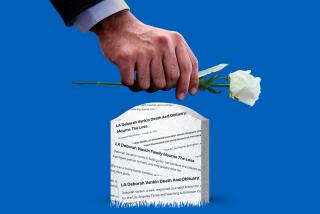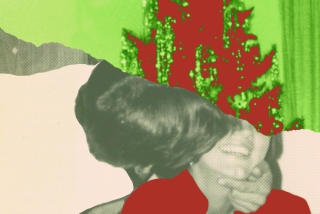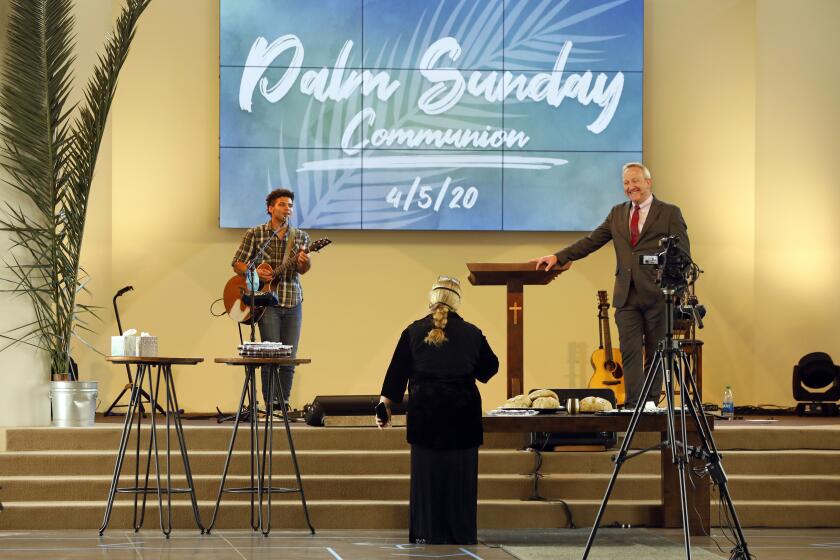Families are turning obituaries into final pleas to avoid COVID-19
WASHINGTON â When Pamela Caddell died of COVID-19 last month, there was no funeral â her family knew that, as a former nurse, she wouldnât want anyone else to be exposed to the disease.
But there was still something her husband, Richard, wanted to say â needed to say â so he sat down in his empty house to write her obituary.
After honoring her decades in medicine and listing her surviving relatives, he included a plea to anyone who picked up the Courier & Press in Evansville, Ind.
âPam died of Covid-19,â Richard wrote. âIt was her fervent wish that everyone take this horrible disease seriously. This was her last wish to all people.â
Richard may not have known it, but the obituary for his wife belongs to a growing genre that dates to the summer. At the time, President Trump and his Republican allies were pushing to keep businesses open and downplaying the possibility of a deadly second wave of infections.
Now with a third wave overwhelming hospitals across the country, Americans are increasingly turning their private grief into public calls for action as the COVID-19 death toll grows by thousands each day.
Unlike Trump, the mourners do not have tens of millions of Twitter followers, nor do television cameras hang on their every word. Instead theyâre buying obituaries in local newspapers, sometimes for several hundred dollars. There have been some efforts to turn the obituaries into a more coordinated activist campaign, but for many itâs a decision they reach on their own, a reflection of their own frustration, anger and pain.
âA lot of people knew my wife,â Richard said. âHer message was to take it seriously. Everybody. Take it seriously. And thereâs a lot of people that Iâm afraid that they donât. They listen to the wrong person.â
Richard and Pamela met when they were teenagers, and she was a carhop at a root beer stand. They got married when he was 21, she 18, and had a son and a daughter.
Although Pamela retired from nursing years ago, she helped care for her sister Debbie, who had become ill with lung cancer. Somehow Debbie contracted the coronavirus and died, and Pamela got sick too.
Four days after testing positive, she turned to Richard shortly after midnight.
âItâs time. Iâm ready to go. Call the ambulance,â she said.
Pamela lingered in the hospital for nearly a month, including weeks on a ventilator, before she died Nov. 27. She was 71.
They would have been married for 53 years in March. Now itâs just Richard, 74, and Harry, the coupleâs 14-year-old pug.
âI have never lived alone before in my whole life,â Richard said. âAnd it is not easy adjusting.â
Richard wrote about his wifeâs selflessness in her obituary: âShe never took away from people and her greatest satisfaction was helping people. She was happiest when she saw the smiles from all the people in her life.â
âThatâs the type of person Pam was,â Richard said. âAnd people should know that. And she should not be dead. She should be alive.â
::
Kristin Urquiza had no doubt about how she would choose to remember her father, Mark Urquiza, in his obituary.
âFar too often, leadership failure is hidden in the private grief of everyday people,â said Kristin, 39, a deputy director at an environmental activism organization in San Francisco. âI had no recourse other than to be honest.â
She wrote: âMark, like so many others, should not have died from COVID-19. His death is due to the carelessness of the politicians who continue to jeopardize the health of brown bodies through clear lack of leadership, refusal to acknowledge the severity of this crisis, and inability and unwillingness to give clear and decisive direction on how to minimize risk.â
Kristin called it an âhonest obituary,â one that reckoned not only with the loss of a loved one but also with the broader political and public health context of their death.
She had tried to keep her father from gathering with friends and family in Phoenix, but he wasnât worried.
âKristin,â he told her, âwhy would the governor say itâs safe when itâs not safe?â
âI couldnât compete with that,â she said.
Kristin believes her father, who worked as an inspector at an aerospace factory before getting furloughed, contracted the virus at a karaoke party. She was driving home to see him when he died June 30.
Two months after his death, Kristin briefly commanded a national spotlight when she spoke at the Democratic National Convention, memorably saying that her fatherâs âonly preexisting condition was trusting Donald Trump.â Sheâs gone on to raise money to help others hold vigils and publish obituaries for their loved ones.
âObituaries are sort of an advertisement for the dead. I wanted the last word,â she said. âMy dad was ripped from my life without my permission, without his permission, without the opportunity to say goodbye. It was my opportunity to push back.â
::
It took a month before Paul Garvison was ready to write an obituary for his father, John.
âThere was a lot of anger,â he said. âIt didnât need to be this way.â
John was 95 and had chronic obstructive pulmonary disease, so his family knew that an infection could prove fatal. But when he did contract the virus, he seemed to improve after a weeklong hospitalization, and Paul drove him back to his nursing home in Virginia.
The recovery didnât last. When Paul visited him again, he had to wear a protective suit, face covering, gloves and goggles.
âIâm not sure he recognized me by then,â Paul said. John died Nov. 5.
About a week before, the presidentâs eldest son, Donald Trump Jr., said the death toll had fallen to âalmost nothing.â
Paul decided to place the obituary in Santa Cruz, where his father had worked for the county, establishing a program for placing and caring for adopted children.
âHis death was due to neglect of the vulnerable by the Trump Administration, which has consistently downplayed the dangers of this terrible disease,â the obituary said. âDue to isolation requirements to prevent the spread of the virus, his family was not able to be with him.â
Paul said he wanted the world to know that the virus isnât something that just happens to other people.
âYou hear a lot of âI donât know anybody who really has it,ââ he said. âWell, now you do. Now you know somebody whoâs died of it.â
::
Most obituaries run in a local newspaper or are posted on a funeral home website. They typically circulate just among friends and family, but occasionally one goes viral, which is what happened when Courtney Farr wrote about his father, Marvin.
Marvin was living in a nursing home in Scott City, Kan., and he became the fourth resident to test positive in an outbreak that began shortly before Thanksgiving. His son could only say goodbye through a video call from his phone.
Courtney had studied journalism as a college student, and he relied on that training as he wrote about Marvinâs death Dec. 1.
âHe died in a room not his own, being cared for by people dressed in confusing and frightening ways,â he wrote. âHe died with covid-19, and his final days were harder, scarier and lonelier than necessary. He was not surrounded by friends and family.â
Then Courtney poured out his frustration at the lack of a communal response to the pandemic.
âHe was born into an America recovering from the Great Depression and about to face World War 2, times of loss and sacrifice difficult for most of us to imagine. Americans would be asked to ration essential supplies and send their children around the world to fight and die in wars of unfathomable destruction. He died in a world where many of his fellow Americans refuse to wear a piece of cloth on their face to protect one another.â
The obituary ricocheted across the internet, and Courtney soon found himself speaking about his father to journalists from cable news and public radio.
Every day, one or two letters or cards show up at his house, often from healthcare workers or people who have also lost a loved one to the virus. His Facebook page has been flooded with comments.
âMy mother died in much the same way of Covid in April, and I have felt the same frustration and anger towards people who continue to say it is their decision to wear a mask and they think the virus is a hoax,â one person wrote. âEvery time I hear that, I want to scream.â
âMy mother died alone in a nursing home in August,â wrote another. âSending love and prayers.â
Sometimes the response has been overwhelming, but Courtney said heâs come to understand why his fatherâs obituary struck such a chord.
âJust to read something or see someone who feels like they understand where you are â it can be so powerful. It relieves that loneliness element of it,â he said. âIf thatâs the only thing that comes from it, then all of this was worth it.â
More to Read
Get the L.A. Times Politics newsletter
Deeply reported insights into legislation, politics and policy from Sacramento, Washington and beyond. In your inbox three times per week.
You may occasionally receive promotional content from the Los Angeles Times.









